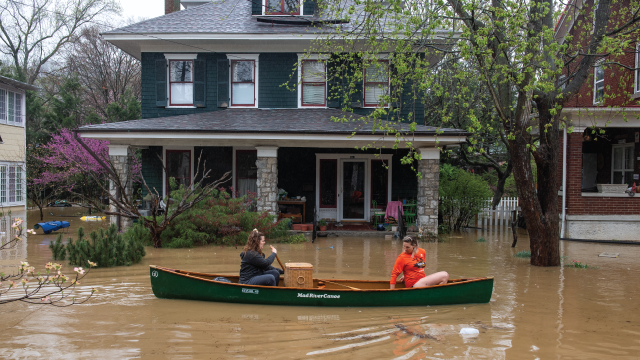
As weather and climate disasters costing over $1 billion in damages become regular occurrences in the United States, a new Pew Research Center survey finds that 77% of Americans say stricter building standards are a good idea for communities at high risk of extreme weather. These findings come amid conversations about scaling back the role of the Federal Emergency Management Agency (FEMA) in setting standards and working with states to handle disaster response.
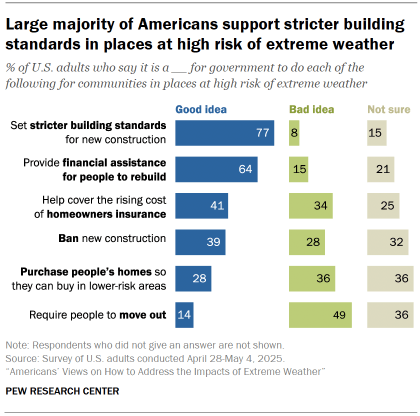
The survey also finds that 64% of Americans think it is a good idea for government to provide financial assistance for people in high-risk communities to rebuild in the wake of extreme weather events, illustrating the multiple considerations Americans bring to conversations about how the country should deal with the growing impacts of extreme weather.
The survey conducted from April 28 to May 4, 2025, among 5,085 U.S. adults explores attitudes about the steps government could take to address extreme weather impacts, as well as the link Americans see between extreme weather and climate change. The report builds on long-standing efforts at the Center to understand how Americans think about the interrelated issues of energy, climate and extreme weather.
Key highlights:
- Americans have mixed views on government helping homeowners cover the rising cost of insurance: 41% say this is a good idea, while 34% call it a bad idea.
- Americans express some openness to banning new construction in areas at high risk of extreme weather (39% say good idea vs. 28% say bad idea). But few support requiring people to move out of high-risk areas (only 14% say this is a good idea). On this and other policy steps, many Americans say they are not sure, underscoring the developing nature of public views on this issue.
- Most Americans who have experienced extreme weather in the last year say climate change played a role. Across each of the five types of extreme weather events we asked about (like intense storms or floods), at least eight-in-ten who experienced the event say climate change contributed a lot or a little.
- Partisanship shapes perceptions of extreme weather itself, as well as the connection to climate change. Republicans are less likely to report extreme weather events than Democrats. And while most Republicans who do report experiencing extreme weather events draw a link to climate change, they are much less likely than Democrats to see a strong connection.
Views among Republicans and Democrats on extreme weather policies
On actions government could take around extreme weather, there are notable areas of common ground between Republicans and Democrats.
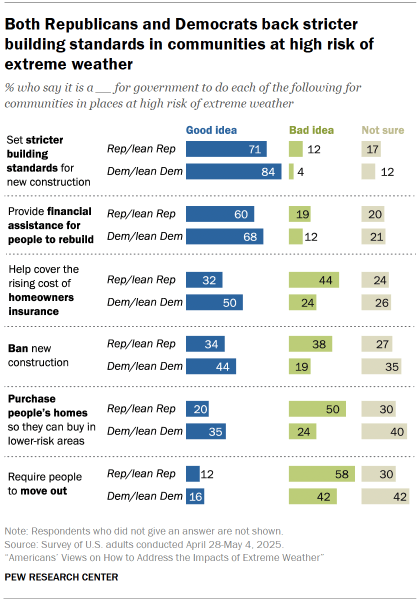
Amid recent debates over the impacts of stricter building codes, large shares of both Democrats and Democratic-leaning independents (84%) as well as Republicans and Republican leaners (71%) say it is a good idea for government to set stricter building standards for new construction in communities at high risk of extreme weather.
Similarly, majorities of both groups also think it’s a good idea for government to provide financial assistance for people in high-risk areas to rebuild after extreme weather impacts.
Differences emerge on other potential steps. On balance, more Republicans say it is a bad idea than a good idea for government to help people with the rising cost of homeowners insurance (44% vs. 32%). By contrast, larger shares of Democrats view this as a good idea than a bad one (50% vs. 24%). Among both groups, about a quarter say they are not sure. Debates about how to handle rising premiums are taking place around the country, including in California in the wake of devastating wildfires.
When it comes to the idea of government banning new construction in high-risk areas, Republicans are split: 34% say this is a good idea, while 38% say it is a bad idea. Democrats are more open to this approach (44% say good idea vs. 19% say bad idea).
Both Republicans and Democrats express far more negative than positive sentiment when it comes to the idea of government requiring people to move out of areas at high risk of extreme weather.
Views on these six potential government actions among the general public – and partisan groups – are largely similar to those measured in a 2024 Center survey. Still, support for government providing financial assistance for people to rebuild has increased 10 percentage points among Republicans and 5 points among Democrats since last year.
Extreme weather and its link to climate change
Climate scientists have found that climate change is driving an increase in extreme weather, as documented in the Intergovernmental Panel on Climate Change report.
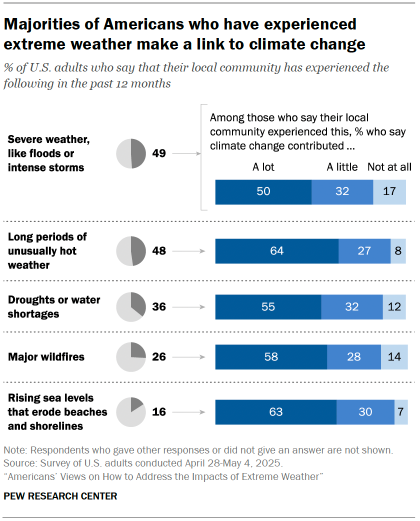
Overall, 74% of Americans say they’ve experienced at least one of five forms of extreme weather in the past 12 months. Among those reporting any of these experiences, majorities view climate change as a contributor to the extreme weather.
For instance, among the roughly half of Americans who say they have experienced long periods of unusually hot weather in the last year, 91% say climate change contributed either a lot (64%) or a little (27%) to this.
Large majorities who have experienced other forms of extreme weather, including major wildfires and floods and intense storms, also say climate change contributed a lot or a little to these events.
Go to the Appendix for more details about experiences of extreme weather events across U.S. geographic regions.
Partisan differences in reporting extreme weather
Partisanship is a factor that shapes both Americans’ reporting of extreme weather events and the connection they see to climate change.
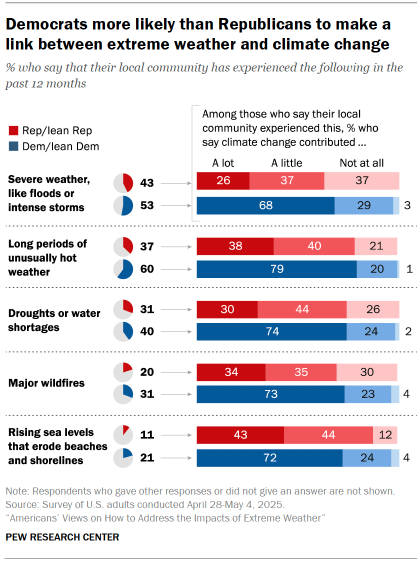
Republicans are less likely than Democrats to report experiencing extreme weather – a difference that holds even when taking into account where people live.
For instance, 60% of Democrats say they experienced long periods of unusually hot weather in the last year, compared with 37% of Republicans. Gaps for other, more specific events – like major wildfires – tend to be more modest; but the pattern holds across all five forms of extreme weather included in the survey.
Put another way, even when comparing views among Republicans and Democrats in the same geographic region, Democrats perceive more unusual or extreme weather events.
How Republicans and Democrats view the link between extreme weather and climate change
Overwhelming shares of Democrats who have experienced extreme weather in the last year say climate change played a role, including majorities who say climate change contributed a lot.
For instance, 98% of Democrats who report experiencing droughts or water shortages in the last year say climate change contributed either a lot (74%) or a little (24%).
On balance, Republicans who report extreme weather also see a link to climate change, but to a lesser extent than Democrats.
When it comes to droughts or water shortages, about three-quarters of Republicans who say they’ve experienced these events recently believe climate change contributed either a lot (30%) or a little (44%).
Similar patterns are seen between partisan groups on the four other forms of extreme weather included in the survey.




